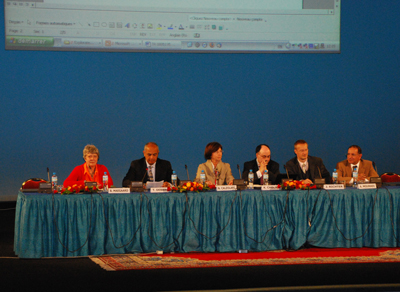This year LREC broke many records: we accepted 645 papers out of the more than 900 submissions, and we had over 1,100 participants from all continents. In addition, over 30 satellite events such as tutorials and workshops took place, increasing the chances of discussion and exchange. These figures indicate the great vitality of the broad area of Language Resources (LR) and Evaluation and bear witness to the existence of a strong LR community. The conference was organised by ELRA (the European Language Resources Association) in cooperation with a wide range of international associations and organisations.
Since its creation in February 1995, ELRA (the European Language Resources Association) has focused its activities on a central point of interest: Language Resources and Evaluation. A main motivation for this orientation is to be able to focus on the need for common sharing and utilization of the LRs that are required for research and development activities in the Human Language Technology communities.

LREC has become an important observation post for feeling the pulse of today's initiatives in the field, with the possibility not just of listening to the "best or most innovative" method or technique, but of examining the wide diversity of approaches, the variety of resources for many languages including "minority" ones, new emerging trends, large projects, initiatives and infrastructures. This broadness of themes, topics and perspectives is an essential contribution towards forming a better global vision of our field and thus stimulating new ideas.
We no longer have to defend or promote the 'data-driven' approaches: they are pervasive and have a well-deserved and ample recognition as the necessary infrastructure underlying Language Technology (LT). It is the merit (mostly) of LRs that LT acquires the maturity and attains the robustness needed to be truly usable in applications with a great impact in the society. Nevertheless, LREC does not exclude presentation of other approaches.
The achievement of a worldwide linguistic infrastructure, however, requires the coverage not only of a range of technical aspects, but also and maybe most critically of a number of organisational aspects. The consistent growth of the field brings in itself some sort of revolution, and the need for convergence of the many communities now acting separately, such as LR and LT developers, text, speech and multimodal specialists, terminology, semantic web and ontology experts, content providers, linguists and so on. This is one of the challenges for the immediate future, for a usable and useful 'language' scenario in the global and multilingual network. LREC plays an important role in the integration of these various communities.
This does not mean that there are no infrastructural issues still to be discussed and solved. Important examples are the problem of LR maintenance, or the critical issues of interoperability and sharing. The fact that some interesting debates took place during different panels highlights these aspects (eg, panel on data centre missions). The huge growth of the field should be complemented by a reflection on priorities and future strategies. The fact that a number of strategic-infrastructural initiatives are now being launched in all the continents represents an enormous achievement and opportunity for our field. It is a sign that funding agencies recognise the strategic value of our work and the importance of helping coherent growth through a number of coordinated actions. LREC, together with its workshops, is the place where these and future initiatives are presented, discussed, and promoted.
All the LREC Proceedings, together with the proceedings of the accompanying workshops, will be made available on the web as a service to the community.
Links:
http://www.lrec-conf.org/
http://www.elra.info
http://www.elda.org/
Please contact:
Nicoletta Calzolari
ILC-CNR, Italy
E-mail: nicoletta.calzolariilc.cnr.it
Khalid Choukri
ELRA/ELDA
E-mail: choukrielda.org










